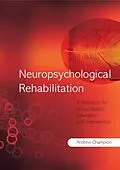Around 10 million people in the UK suffer from a neurological
disorder, one million of whom are disabled by their condition.
Neurological disorders that can affect cognitive functioning
include stroke, head injury, multiple sclerosis and dementia.
Historically the emphasis within neurology has been on
diagnosis. Now neurologists also have to train in
neuro-rehabilitation in order to help patients to cope with their
condition, and they increasingly work within multi-disciplinary
teams.
The bulk of the book is formed of sessions plans for the six
sessions over which the group may be run. The session plans
includes a 'script' for the facilitator, slides and
handouts. The introductory chapter will review the literature
supporting the implementation of such groups, and the final chapter
will go through some of the frequently asked questions.
Autorentext
Dr Andrew Champion is a Clinical Psychologist within the Health Psychology department at Gloucester Hospitals NHS Foundation Trust. He has published numerous journal articles in the area of clinical health psychology.
Klappentext
The understanding and management of cognitive difficulties by patients, family members and staff are central elements in neurorehabilitation. However, they are often not facilitated in a formal way due to constraints of time, staffing or other resources.
Neuropsychological Rehabilitation is a ready-to-use therapy tool that provides the resources required to run a six-session information provision/rehabilitation group for people with brain injury, their families and rehabilitation staff. It begins with a rationale for running such groups and presents a case for increasing the allocation of resources to structured information provision. Subsequent chapters provide a collection of materials that enable the professional to run group sessions. Information is presented session-by-session in the form of a 'script' and includes prepared handouts and slides for topics such as memory, attention and executive function. Individual sessions are suitable for standalone use, and a chapter covering frequently asked questions is also included.
This accessible resource provides the materials required for running groups in one easy-to-use volume, thus minimising the preparation time for busy professionals. It will be an invaluable tool for healthcare professionals working as part of a multi-disciplinary team in a neurological setting, including psychologists, speech and language therapists, occupational therapists, nursing staff and medical staff.
On-Line Resources:
The handouts and slides included in this book are available online free to purchasers of the print version.
Visit the website www.wiley.com/go/neuropsych to find out how to access and download this material.
Zusammenfassung
Around 10 million people in the UK suffer from a neurological disorder, one million of whom are disabled by their condition. Neurological disorders that can affect cognitive functioning include stroke, head injury, multiple sclerosis and dementia.
Historically the emphasis within neurology has been on diagnosis. Now neurologists also have to train in neuro-rehabilitation in order to help patients to cope with their condition, and they increasingly work within multi-disciplinary teams.
The bulk of the book is formed of sessions plans for the six sessions over which the group may be run. The session plans includes a 'script' for the facilitator, slides and handouts. The introductory chapter will review the literature supporting the implementation of such groups, and the final chapter will go through some of the frequently asked questions.
Inhalt
About the Author.
Acknowledgements.
Chapter 1: Information Provision in Neuro-rehabilitation.
Chapter 2: Before the First Session.
Chapter 3: Introduction to the Brain and Brain Injury.
Chapter 4: Attention.
Chapter 5: Memory.
Chapter 6: Executive Function.
Chapter 7: Thoughts and Feelings.
Chapter 8: Communication, Planning Movements and Perception.
Chapter 9: Frequently Asked Questions.
References.
Index.
